
Sir Alfred Joseph Hitchcock was an English filmmaker. He is widely regarded as one of the most influential figures in the history of cinema. In a career spanning six decades, he directed over 50 feature films, many of which are still widely watched and studied today. Known as the "Master of Suspense", he became as well known as any of his actors thanks to his many interviews, his cameo roles in most of his films, and his hosting and producing the television anthology Alfred Hitchcock Presents (1955–65). His films garnered 46 Academy Award nominations, including six wins, although he never won the award for Best Director despite five nominations.

Psycho is a 1960 American psychological horror thriller film produced and directed by Alfred Hitchcock. The screenplay, written by Joseph Stefano, was based on the 1959 novel of the same name by Robert Bloch. The film stars Anthony Perkins, Janet Leigh, Vera Miles, John Gavin and Martin Balsam. The plot centers on an encounter between on-the-run embezzler Marion Crane (Leigh) and shy motel proprietor Norman Bates (Perkins) and its aftermath, in which a private investigator (Balsam), Marion's lover Sam Loomis (Gavin), and her sister Lila (Miles) investigate her disappearance.
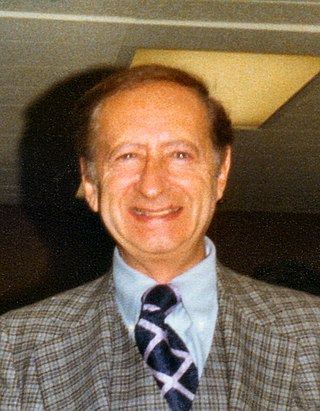
Robert Albert Bloch was an American fiction writer, primarily of crime, psychological horror and fantasy, much of which has been dramatized for radio, cinema and television. He also wrote a relatively small amount of science fiction. His writing career lasted 60 years, including more than 30 years in television and film. He began his professional writing career immediately after graduation, aged 17. Best known as the writer of Psycho (1959), the basis for the film of the same name by Alfred Hitchcock, Bloch wrote hundreds of short stories and over 30 novels. He was a protégé of H. P. Lovecraft, who was the first to seriously encourage his talent. However, while he started emulating Lovecraft and his brand of cosmic horror, he later specialized in crime and horror stories working with a more psychological approach.
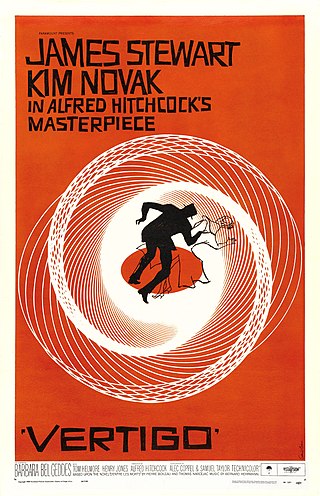
Vertigo is a 1958 American psychological thriller film directed and produced by Alfred Hitchcock. The story was based on the 1954 novel D'entre les morts by Boileau-Narcejac. The screenplay was written by Alec Coppel and Samuel A. Taylor. The film stars James Stewart as former police detective John "Scottie" Ferguson, who has retired because an incident in the line of duty has caused him to develop acrophobia and vertigo, a false sense of rotational movement. Scottie is hired by an acquaintance, Gavin Elster, as a private investigator to follow Gavin's wife, Madeleine, who is behaving strangely.
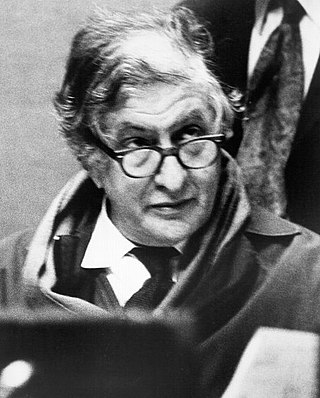
Bernard Herrmann was an American composer and conductor best known for his work in composing for films. As a conductor, he championed the music of lesser-known composers. He is widely regarded as one of the greatest film composers. Alex Ross writes that "Over four decades, he revolutionized movie scoring by abandoning the illustrative musical techniques that dominated Hollywood in the 1930's and imposing his own peculiar harmonic and rhythmic vocabulary."

Jeanette Helen Morrison, known professionally as Janet Leigh, was an American actress, singer, dancer, and author. Her career spanned over five decades. Raised in Stockton, California, by working-class parents, Leigh was discovered at 18 by actress Norma Shearer, who helped her secure a contract with Metro-Goldwyn-Mayer.

Notorious is a 1946 American spy film noir directed and produced by Alfred Hitchcock, starring Cary Grant, Ingrid Bergman, and Claude Rains as three people whose lives become intimately entangled during an espionage operation.
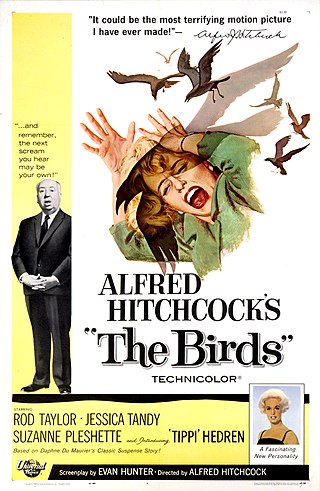
The Birds is a 1963 American natural horror-thriller film produced and directed by Alfred Hitchcock. Loosely based on the 1952 short story of the same name by Daphne du Maurier, it focuses on a series of sudden and unexplained violent bird attacks on the people of Bodega Bay, California, over the course of a few days.

Vera June Miles is an American retired actress who worked closely with Alfred Hitchcock, most notably as Lila Crane in the classic 1960 film Psycho, reprising the role in the 1983 sequel Psycho II. Other films in which she appeared include Tarzan's Hidden Jungle (1955), The Searchers (1956), Alfred Hitchcock's The Wrong Man (1956), A Touch of Larceny (1959), The Man Who Shot Liberty Valance (1962), Follow Me, Boys! (1966), Hellfighters (1968), Sergeant Ryker (1968), and Molly and Lawless John (1972).

The Mountain Eagle is a 1926 silent drama film, and Alfred Hitchcock's second as director, following The Pleasure Garden. The film, a romantic melodrama set in Kentucky, is about a widower who jealously competes with his crippled son and a man he loathes over the affections of a schoolteacher. The film was mostly produced at the Emelka Film studios in Munich, Germany in autumn of 1925, with exterior scenes shot in the village of Obergurgl in the State of Tyrol, Austria. Production was plagued with problems, including the destruction of a village roof and Hitchcock experiencing altitude sickness. Due to producing the film in Germany, Hitchcock had more directorial freedom than he would have had in England, and he was influenced by German cinematic style and technique.
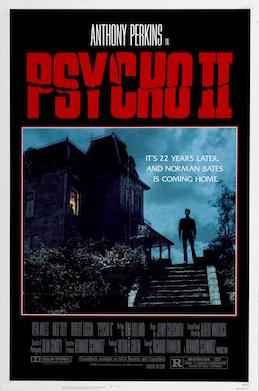
Psycho II is a 1983 American psychological slasher film directed by Richard Franklin, written by Tom Holland, and starring Anthony Perkins, Vera Miles, Robert Loggia, and Meg Tilly. It is the first sequel to Alfred Hitchcock's 1960 film Psycho and the second film in the Psycho franchise. Set 22 years after the first film, it follows Norman Bates after he is released from the mental institution and returns to the house and Bates Motel to continue a normal life. However, his troubled past continues to haunt him as someone begins to murder the people around him. The film is unrelated to the 1982 novel Psycho II by Robert Bloch, which he wrote as a sequel to his original 1959 novel Psycho.

The following is a partial list of unproduced Alfred Hitchcock projects, in roughly chronological order. During a career that spanned more than half a century, Alfred Hitchcock directed over fifty films, and worked on a number of others which never made it beyond the pre-production stage.

The Living and the Dead is a 1954 psychological mystery novel by Boileau-Narcejac, originally published in French as D'entre les morts. It served as the basis for Alfred Hitchcock's 1958 film Vertigo.

Alfred Hitchcock (1899–1980) was an English director and filmmaker. Popularly known as the "Master of Suspense" for his use of innovative film techniques in thrillers, Hitchcock started his career in the British film industry as a title designer and art director for a number of silent films during the early 1920s. His directorial debut was the 1925 release The Pleasure Garden. Hitchcock followed this with The Lodger: A Story of the London Fog, his first commercial and critical success. It featured many of the thematic elements his films would be known for, such as an innocent man on the run. It also featured the first of his famous cameo appearances. Two years later he directed Blackmail (1929) which was his first sound film. In 1935, Hitchcock directed The 39 Steps; three years later, he directed The Lady Vanishes, starring Margaret Lockwood and Michael Redgrave.
Hitchcockian films are those made by various filmmakers, with the styles and themes similar to those of Alfred Hitchcock.

George Tomasini was an American film editor, born in Springfield, Massachusetts, who had a decade long collaboration with director Alfred Hitchcock, editing nine of his movies between 1954 and 1964. Tomasini edited many of Hitchcock's best-known works, such as Rear Window (1954), Vertigo (1958), North by Northwest (1959), Psycho (1960), and The Birds (1963), as well as other well-received films such as Cape Fear (1962). On a 2012 listing of the 75 best edited films of all time, compiled by the Motion Picture Editors Guild based on a survey of its members, four films edited by Tomasini for Hitchcock appear. No other editor appeared more than three times on this listing. The listed films were Psycho, Vertigo, Rear Window, and North by Northwest.

Mort Mills was an American film and television actor who had roles in over 150 movies and television episodes. He was often the town lawman or the local bad guy in many popular westerns of the 1950s and 1960s.
Margaret Robertson was a British script supervisor and personal assistant to Alfred Hitchcock from the 1940s to the 1970s during which time she worked on his early films Under Capricorn (1948) and Stage Fright (1950), before joining his team permanently on Vertigo (1958), working thereafter on all of the director's remaining films.
James P. Cavanagh was an American television writer. He wrote numerous episodes for Alfred Hitchcock Presents and won a Primetime Emmy in 1957 for his teleplay Fog Closing In. Cavanagh wrote the first script for the 1960 film Psycho. Though the script was rejected by Hitchcock it contained many similarities with the final version, written by Joseph Stefano.













